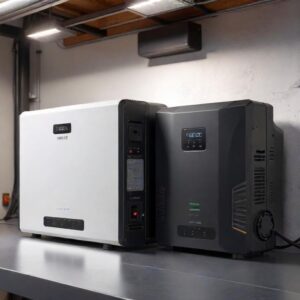Inverter Wattage Comparison
2000w vs 3000w Inverter: What You Need to Know
When choosing between a 2000w and a 3000w inverter, understanding their differences is crucial for optimizing power usage. This article breaks down the key aspects of both options, helping you make an informed decision.
Power Output Comparison
The primary difference between a 2000w inverter and a 3000w inverter is in their power output capacity. This can significantly affect the types of appliances you can use. Here’s a quick comparison:
| Feature | 2000w Inverter | 3000w Inverter |
|---|---|---|
| Continuous Power | 1800w | 2700w |
| Peak Power | 4000w | 6000w |
| Weight | Lightweight | Heavier |
How to Choose: 2000w vs 3000w Inverter
Choosing the right inverter depends on your power requirements. For smaller appliances like laptops and lights, a 2000w inverter may suffice. However, if you need to run multiple devices or larger appliances like refrigerators or power tools, you may want to consider the 3000w inverter.
Benefits of Each Option
- 2000w Inverter: More portable and energy-efficient for low power needs.
- 3000w Inverter: Greater flexibility for high-demand devices and simultaneous use of multiple appliances.
Understanding these differences can guide you in deciding which inverter is best suited for your needs, enhancing your efficiency in power management.
10 Key Facts About 2000w vs 3000w Inverter
- How does 2000w vs 3000w inverter work? It converts DC to AC, providing usable power.
- Can you easily 2000w vs 3000w inverter? Yes, especially if you evaluate your power needs first.
- What appliances can be powered? A 2000w inverter can handle smaller devices, while a 3000w inverter supports heavier loads.
- Price difference between them? Generally, a 3000w inverter is more expensive due to higher power handling capacity.
- Efficiency ratings? Efficiency can vary, but typically both offer around 85-90% efficiency.
- Size and portability? A 2000w model is often lighter, making it better for portable setups.
- Installation ease? Both require similar installation processes, but confirm grounding and ventilation.
- Battery size recommendations? Use a larger battery with a 3000w inverter for optimal performance.
- Are both suitable for off-grid setups? Yes, both can work in off-grid situations but must be matched to load requirements.
- Do manufacturers offer warranties? Yes, most reputable brands provide warranties that vary by model.
“Hey, great post! 🤔 I’ve been wondering if the extra power on the 3000w is actually worth it. Like, do you really notice a difference? I just wanna run my fridge while camping, haha!”
“Honestly, I was leaning towards the 2000w, but now I’m not so sure. Are the benefits of the 3000w really that big? Kinda confused here.”
“Lol love how you broke this down! I mean, who knew choosing an inverter could be a whole thing? Gotta admit, I just want something that works without blowing up 😂”
“Good info! I’ve heard mixed things about these inverters. Think I should just save up for the 3000w, or is the 2000w enough for a couple of small gadgets?”
Hey, great comparison! I just got a 2000w inverter, but now I’m kinda wondering if I should’ve gone bigger 🤔. Does anyone have experience with both? What’s your take on efficiency at higher wattage?
Solid info! I’ve been debating between the two for my camper. Do you think the 3000w is worth the extra bucks? Anyone tried powering appliances with it?